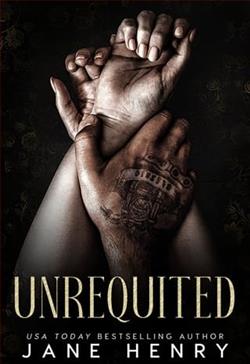Page 172 of The Daughters of Avalon
“Sacred Water?”
“Aye,” Rosalynde said. “It might not protect us from the firmament, but it could keep Morwen and her minions from crossing themotte. We could divert the river, fill the ditch, then bless themottewith this spell.” She tapped the Book again.
Elspeth lifted a brow. “Whatmotte?”
Rosalynde sighed. “We do have amotte,” she persisted. “You must know, it takes time to rebuild, and truth be told, this is why I cannot leave. There is too much to be done, and I will not abandon Warkworth.”
“What about Edmond? Is he not your steward?”
“Newly appointed,” Rosalynde said. “He knows little.”
“Little as you?”
Arching her brow again, in much the same way Elspeth was wont to do, Rosalynde countered, in a high-handed voice. “As little as you when you came to be Lady of Aldergh?”
“Point well made,” Elspeth relented, because that was true. Until she’d applied herself to the task, she hadn’t had the first clue how to run a castle. She still wouldn’t know how to lead a garrison, nor command a workforce. But these were tasks better left to her lord husband, and nevertheless Rosalynde was here prancing about in men’s leathers, trying to wield a hefty sword that was more than twice her size. It befuddled Elspeth, and she didn’t see a woman grown when she looked at her baby sister.
“And yet you flourished.” Rosalynde persisted.
When Elspeth pursed her lips in answer, Rosalynde continued, “Do not gainsay me, Elspeth. I have been to your home. You are an excellentchatelaine, sister mine, and so, too, will I be with time.”
Elspeth pouted, because that was, precisely, what she was afraid of; she didn’t know how much time they had. Any given moment their mother could arrive with the King’s army, and Eustace had already demolished Warkworth once, burning the entire castle, with its lord and lady asleep in their beds. By the cauldron. She had never heard a more horrific tale. Any man who could rise above this, to help Morwen’s daughter, was a saint.
And truly, if, indeed, he so wished to exact revenge, agreeing to help Seren would be the perfect way to do it. He could strangle her in her sleep, and no one would be there to stop him. And why wouldn’t he?
Wilhelm and Giles—half-brothers by blood—were the only survivors of a once noble family, but only because neither was present at the time of the burning. Wilhelm, so she’d been told, arrived in the wee hours, with the castle and fields still smoking and the stench of death wafting in the air, only to discover that his entire family—father, brother, sisters, and sister-by-law, the latter pregnant with her firstborn child—burnt in their beds. If that could be the fate of adonjonbuilt of wood, a marquee was entirely too vulnerable.
“I have a well-equipped garrison at my command,” Rosalynde said, laying a hand atop Elspeth’s arm to assuage her. “Moreover, my husband left his best warriors at my command.”
“His best?”
Rosalynde sighed. “Stop arguing, Elspeth. I grow weary. It helps not at all.”
Elspeth sighed as well, blinking back tears as she glanced down at the page… at the warding spell her sister had proposed—and then suddenly recalling a trick her grandmamau taught her. She bent close, blowing softly over the vellum, searching for hidden script.
She frowned when she noted the shimmering symbol that materialized—a downturned triangular mark.
This was the arcane symbol for water, but it lay encircled, which was the mark of the divine. “Rosalynde… to cast this spell you needwitchwater,” she explained. “That is not a thing you can make, nor summon if you’ve not the power to do so. ’Tis not the same as water you bless.” She met her sister’s shimmering blue eyes—eyes that were so like her own. “To my knowledgenoneof us have ever summoned elements in this fashion—notwitchwater,witchwindnorwitchfire. Not even Rhiannon.”
“Aye, well… perhaps that is not entirely true,” said Rosalynde. Elspeth blinked and Rosalynde shrugged. “I believe Arwyn could summonwitchfire,” she said.
Elspeth twisted her face.
“’Tis true. I saw her do it once, perhaps twice, though she did not understand what it was, nor did I at the time. ’Tis only now that I’ve had the opportunity to read through thegrimoirethat I understand what I saw. It waswitchfire, no doubt. I know it by its color—that odd, blue flame.”
“Hmm,” said Elspeth, remembering a time at Llanthony when Arwyn scorched Father Ersinius’ opulent robe that lay drying in the yard. She’d been washing the garment when that cantankerous old fool approached her to scold her, bidding Arwyn to watch what she was doing, lest she ruin the material. Later, when no one was looking, while that gown lay drying in the sun with its gold threads shimmering, Arwyn consumed the cloth with a strange blue flame that burned so swiftly and intensely the robe was reduced to ash in the blink of an eye. “I do remember,” she said. “But keep in mind that you cannot fill amottewithwitchwater, if you do not have amotteor if youcannot summonwitchwater. Neither you, nor I, can summonwitchwater.” She swallowed, heard. “Arwyn is dead.”
Rosalynde frowned.
“Well,” Elspeth challenged. “Can you?”
Rosalynde shook her head, looking discouraged. Both sisters fought tears. But, sad as the case might be, they hadn’t the luxury of underestimating their mother, or all would be lost. Now that Elspeth had her babes, she understood precisely what it meant to rise to this task. If she were to lose one child, she couldn’t simply lie down and allow the other to perish. This was a time for strength. “We shall keep looking,” she said. “Do not fret; we will discover a way.”
Nodding, Rosalynde turned the page, then flipped the Book to read a scribbled note in the margin. “There are so many notations here… this is an interesting one: “Did you realize the Mark of the Mother—” The crossed eyes that denoted a Regnant— “Are not always evident at birth?”
“Nay,” said Elspeth. “What does it say?”
“Well, there is an entry here under Mark of the Mother—perhaps in our grandmamau’s hand. It says, carnelian at birth, be apprised, by pubertas, a mark of the wise.”















